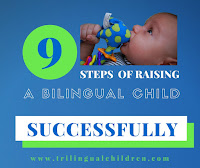 I try to follow my kids' natural interests as I teach them languages. I started introducing letter sounds while reading books and worked on letter - sound recognition day after day through introduction of different activities.
Both of my kids learned how to read well before school. My girl impressed me with reading 3 letter words at the age of 3. ( There was no pushing on my side.)
I try to follow my kids' natural interests as I teach them languages. I started introducing letter sounds while reading books and worked on letter - sound recognition day after day through introduction of different activities.
Both of my kids learned how to read well before school. My girl impressed me with reading 3 letter words at the age of 3. ( There was no pushing on my side.)Writing came on its own as a by product of my affords towards teaching them how to read for both of the kids.
Here are some activities I recommend to help your kids to start writing in minority language:
1. Drawing and writing
I find drawing together with kids is a very important activity that entertains a wide range of age group: babies, toddlers and elementary school kids.You can teach so many things, without your kids realizing all the learning they are doing!
It can be drawing and labelling, writing a story and illustrating it. Creating your own book, a calendar...
In the beginning you do most of the work, but as a child grows and learns, his/her work becomes more and more independent. These days I am amazed by my kids creativity!
2. Playing games where writing is involved

Pretend play “a Restaurant” is such a great game! Kids love to be waiters and write down orders. Lots of orders! Get ready to pretend eating all the dishes you have order :)
3. Dictation
When kids already mastered the letters and writing words, try to experiment with short dictations. First use simple words, then funny phrases and sentences. Allow your child to participate: start a sentence and let him finish it.
 |
| 4 years old child's writing |
4. Use workbooks/ worksheets with letters in your language
In Russia we call it “propisi”. I found great ones with transparent pages that also show the start point for writing a letter and indicate the direction of writing.
Note: do not expect a lot from small kids. Let them write, make mistakes. Only with time and a lot of practice you will see a result.
These are just some activities to help you get started. Try them. Experiment. Work on developing your child's interest for writing based on his other interests.
SOME TIPS FOR PARENTS TEACHING KIDS HOW TO WRITE:
- Attention: do not criticize!
Even if your child is open to corrections and you already correct him/her speaking. Be extremely careful while correcting mistakes in writing. Do not over criticize him/her. You do not want your child lose interest and stop writing. Everything will come.
- Be prepared for unusual ways of writing:
The letters might dance up and down. Your child might break the word in many different places to start it writing from a new line or, another extreme, write a sentence as one long word. He will not always follow the left to right or the right to left writing rule. Your child will make mistakes. And thus, comes next:
- Be patient:
Your child needs time to figure things out.
I hope this helps.
I’m always happy to hear about your own experiences. Please leave your comment below.
If you’d like to share some tips and /or write about your experience as a parent of a bilingual or multilingual child contact me here.
And if you find my post interesting please share it! It might help other parents too:)
You might also like:

7 facts that can determine the language spoken between multilingual siblings.

Kids Radio Sations from around the world!
In so many different languages !
One parent speaks two languages. Raising a trilingual child.

PROS & CONS of Raising a Trilingual Child
Multilingual Family Interview: When your home languages are different from community language. Plus resources for teaching phonics and reading to children in English.








